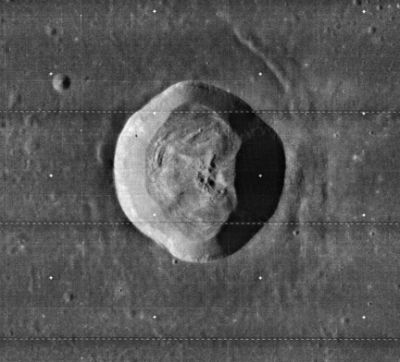Dawes
Contents
[hide]Dawes, with Rima Dawes slightly east-northeast of it
|
Lat: 17.2°N, Long: 26.4°E, Diam: 18 km, Depth: 2.44 km, Rükl: 24, Copernican |

LO4-085-h2
The "bow-shock" slightly east of Dawes is the formation officially known as Rima Dawes.
Images
LPOD Photo Gallery Lunar Orbiter Images Apollo Images
Another close-up of Dawes, made by Lunar Orbiter 5, is Frame 5070. - DannyCaes Feb 24, 2008
High Sun, hi-res view from Ap15 Pan Camera: AS15-P-9874
Maps
(LAC zone 42C3) LAC map Geologic map LM map LTO map
Description
Description: Elger
(IAU Directions) DAWES.--A ring-plain 14 miles in diameter, situated N.E. of Plinius, on a nearly circular light area. Its bright border rises to a height of 2,000 feet above the Mare, and includes a central mountain, a white marking on the W., and a ridge running from the mountain to the S. wall. There are two closely parallel clefts on the N. side of the plateau running from W. to E., that nearer Dawes being the longer, and having a craterlet standing upon it about midway between its extremities. At its E. termination there is a crater-row running at right angles to it. The light area appears to be bounded on the W. by a low curved bank.
Description: Wikipedia
Additional Information
- Depth data from Kurt Fisher database
- Pike, 1976: 2.44 km
- Arthur, 1974: 2.33 km
- Westfall, 2000: 2.31 km
- Viscardy, 1985: 2.3 km
- Cherrington, 1969: 1.79 km
- Exterior impact melt deposits most extensive to SE, max of ~2 km beyond rim, and topographically lowest rim crest to SE & N (Hawke and Head, 1977).
- Thermal anomaly crater, implying youthful age - Moore et al, 1980
- Slightly north of Dawes is a curious system of three rimae and a short craterlet-chain. This system is described and depicted in NASA SP-362, APOLLO OVER THE MOON; A VIEW FROM ORBIT, Chapter 5: Craters (Part 3), Figure 135. The exact location of the system is 18°20' North/ 26°15' East. Detection of this system's exact location:- DannyCaes Feb 24, 2008
- TSI = 15, CPI = 10, FI = 15; MI =40 Smith and Sanchez, 1973
Nomenclature
William Rutter Dawes (19 March 1799 – 15 February 1868) was a British astronomer. Dawes was the son of William Dawes also an astronomer. Dawes was a clergyman who made extensive measurements of double stars as well as observations of planets. An optical phenomenon, the Dawes limit, is named for him.
LPOD Articles
Bibliography
APOLLO OVER THE MOON; A VIEW FROM ORBIT, Chapter 5: Craters (Part 4), Figure 144.
W. R. Dawes in the Sourcebook Project (William R. Corliss)
The mystery of the TRIANGULAR STAR DISCS
- Page 576 in Mysterious Universe, a handbook of astronomical anomalies (1979) :
- A Peculiar Telescopic Phenomenon (Peter Doig, Journal of the British Astronomical Association, 1930).